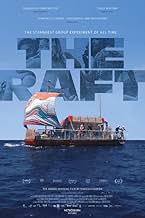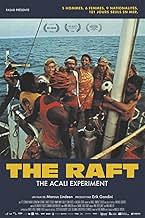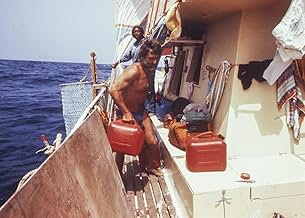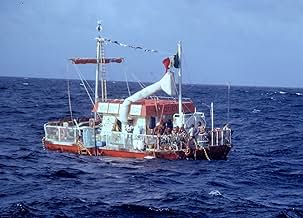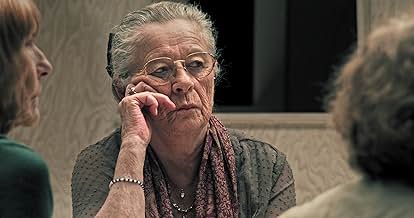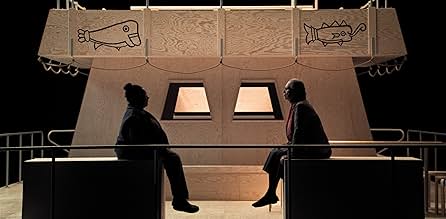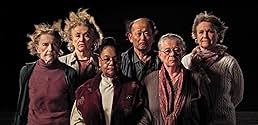CALIFICACIÓN DE IMDb
6.6/10
1.1 k
TU CALIFICACIÓN
En 1973, cinco hombres y seis mujeres cruzaron el Atlántico en una balsa como parte de un experimento científico que estudiaba la sociología de la violencia, la agresión y la atracción sexua... Leer todoEn 1973, cinco hombres y seis mujeres cruzaron el Atlántico en una balsa como parte de un experimento científico que estudiaba la sociología de la violencia, la agresión y la atracción sexual en el comportamiento humano.En 1973, cinco hombres y seis mujeres cruzaron el Atlántico en una balsa como parte de un experimento científico que estudiaba la sociología de la violencia, la agresión y la atracción sexual en el comportamiento humano.
- Dirección
- Guionistas
- Elenco
- Premios
- 6 premios ganados y 8 nominaciones en total
Fe Seymour
- Self
- (as Fé Seymour)
Santiago Genovés
- Self
- (material de archivo)
Bernardo Bongo
- Self
- (material de archivo)
Charles Anthony
- Self
- (material de archivo)
- (as Charles Antoni)
José María Montero Pérez
- Self
- (material de archivo)
Olaf
- Self - Maria Björnstam's Boyfriend
- (material de archivo)
- (voz)
- Dirección
- Guionistas
- Todo el elenco y el equipo
- Producción, taquilla y más en IMDbPro
Opiniones destacadas
This documentary, made now by Marcus Lindeen, but dealing with events that happened in 1973, ought to be hugely exciting, (given the subject matter), but is, in fact, quite boring. It shows and describes a journey across the Atlantic from the Canary Islands to Mexico by six men and five women on a raft as part of a sociological experiment on, amongst other things, aggression by the anthropologist Santiago Genoves.
A good deal of the film is actual footage shot on the raft at the time while in the present those still left alive look back and analyze the experience and it is this part of the film that drags it down. It's like a not very good play in which ancient actors act at playing younger versions of themselves while even the events that happened on the raft turn out to be more than a bit ho-hum. It's really like an intellectual version of "Big Brother", set at sea, and you know how boring that turned out to be. Anyone looking for a bit of titillation is bound to be disappointed.
A good deal of the film is actual footage shot on the raft at the time while in the present those still left alive look back and analyze the experience and it is this part of the film that drags it down. It's like a not very good play in which ancient actors act at playing younger versions of themselves while even the events that happened on the raft turn out to be more than a bit ho-hum. It's really like an intellectual version of "Big Brother", set at sea, and you know how boring that turned out to be. Anyone looking for a bit of titillation is bound to be disappointed.
The premise is fascinating, especially when you get the build up of the first 5-10mins...the problem is...nothing happens.
I'd avoid this sad association with what are usually compelling and insightful Storyville documentaries.
I'd avoid this sad association with what are usually compelling and insightful Storyville documentaries.
This is an unexpected gem, as funny as it is wise. I'd literally never heard of the Acali. Fifteen years on, we were still reading Lord of the Flies at school, and all the grown-ups around me were nodding sagely. Had the media told the story this film tells instead of dubbing Santiago Genovés' ambitious project the sex raft, public opinion might have changed. The anthropologist expected his volunteers to develop aggressions towards each other during their long and lonely voyage. They didn't. So he did. Until he broke down and cried for the first time since childhood. He certainly learned something - about himself. I have rarely seen such a convincing demonstration of the self-help truism that aggression, anger and an overdeveloped need for control stem from repressed grief. Who would have thought that a macho man in his fifties could put us vs. them aside after all, and open up so far? Still, what touched me most was the reunion of the surviving volunteers, more than four decades later: most of all Captain Maria, against whom Genovés mutineered, and engineer Fé, whom he tried to set up with the Catholic priest on the expedition for no better reason than the colour of their skins. Fé's story, in particular, made me want to follow the advice an euphoric Genovés gives to everyone after it's all over: build your own raft! She really nailed it when she said (quoting from memory, sorry for any mistakes): I think Santiago's experiment was a huge success, but he missed it.
A lot of rather dubious "scientific" experiments took place in the 1970s; including Santiago Genoves's plan to isolate a small group of people on a raft drifting across the Atlantic. It appears he intended the situation to resemble 'Love Island' with added fisticufffs; in fact, the group got on quite amicably, and the only person to behave in a threatening manner was the supposedly impartial scientist, who was disappointed with the lack of action. This documentary tells the story, through interviews with many of the survivors; where there is a shortage of archive film, director Marcus Lindeen films them on a contemporary replica of the raft. But ultimately, there's not much of a story here and there's certainly not much science; today this would be marketed as a holiday experience for the ultimate traveller without the intellectual pretensions, and no-one would think it worth filming.
The documentary is about a true story, a human experiment in the 1970's. Films I have seen about such experiments have been interesting so far. How about an idea of crossing the Atlantic on a small raft with unknown people? That is mind-blowing, huh? On top of that, the sailors would be chosen from different cultures and backgrounds, selected by a researcher who is also on board.
The Swedish captain is the only experienced sailor on board. She and the rest of the crew are selected by the researcher Santiago Genovés. I had never heard of him nor the actual experiment before watching The Raft.
Archive footage from the actual raft is great stuff, but it looks too good to be "true" at times. In a way that it could have been shot by a group of friends having fun on a boat. I do believe there has been hours of film footage from the journey to choose from. Both the happy and horrible moments. I do not want to spoil it, so I am not telling more about the footage.
Santiago Genovés desperately wanted to see some kind of primitive behavior on Acali, as the raft was called. Genovés is portrayed himself to have been mentally off-tuned. He tried to manipulate and provoke the crew so that he could to see more conflicts and violence.
Hearing the original crew members to open up about their well-kept secrets, feelings and memories is touching. The replica of the raft is very well made but studio athmosphere is not an ocean. The reunion on "the raft" after decades is a great idea and makes the crew recall some details.
There are still many questions after seeing The Raft and probably I need to find out myself if I want to know what happened after all. I expected something different, but it was worth seeing this film!
The Swedish captain is the only experienced sailor on board. She and the rest of the crew are selected by the researcher Santiago Genovés. I had never heard of him nor the actual experiment before watching The Raft.
Archive footage from the actual raft is great stuff, but it looks too good to be "true" at times. In a way that it could have been shot by a group of friends having fun on a boat. I do believe there has been hours of film footage from the journey to choose from. Both the happy and horrible moments. I do not want to spoil it, so I am not telling more about the footage.
Santiago Genovés desperately wanted to see some kind of primitive behavior on Acali, as the raft was called. Genovés is portrayed himself to have been mentally off-tuned. He tried to manipulate and provoke the crew so that he could to see more conflicts and violence.
Hearing the original crew members to open up about their well-kept secrets, feelings and memories is touching. The replica of the raft is very well made but studio athmosphere is not an ocean. The reunion on "the raft" after decades is a great idea and makes the crew recall some details.
There are still many questions after seeing The Raft and probably I need to find out myself if I want to know what happened after all. I expected something different, but it was worth seeing this film!
Selecciones populares
Inicia sesión para calificar y agrega a la lista de videos para obtener recomendaciones personalizadas
- How long is The Raft?Con tecnología de Alexa
Detalles
- Fecha de lanzamiento
- Países de origen
- Sitio oficial
- Idiomas
- También se conoce como
- The Raft
- Locaciones de filmación
- Canary Islands, Canarias, España(departure of the trek)
- Productoras
- Ver más créditos de la compañía en IMDbPro
Taquilla
- Total en EE. UU. y Canadá
- USD 39,678
- Total a nivel mundial
- USD 47,269
- Tiempo de ejecución1 hora 37 minutos
- Color
- Mezcla de sonido
- Relación de aspecto
- 2.35 : 1
Contribuir a esta página
Sugiere una edición o agrega el contenido que falta



